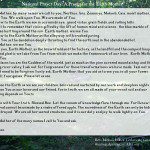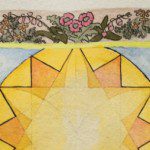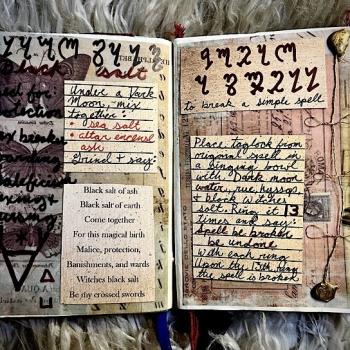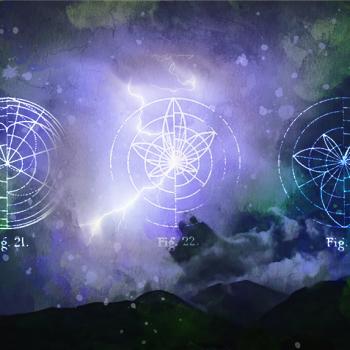As our interlocking Pagan religions continue to emerge we are met with the ongoing challenges of supporting the folk of our religions. My work as a priest, one might even call it my ministry, comes not only from the training and mission of ADF, but more importantly, from the folk who call me their priest. After all, I swore my oath:
To love the land, serve the folk, and honor the gods.
There are many who say that to be a pagan priest is to keep the rites and rituals. They say that above all else a pagan priest should be a ritual specialist. I am a ritual specialist, and good at it. But the congregation that I serve, and druids I speak with all over the country need more than just a ritual specialist. I am called to serve in many ways.
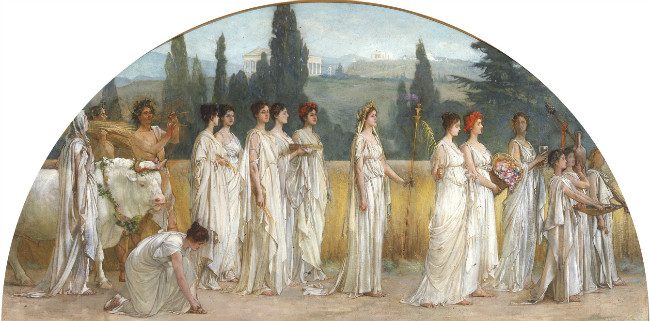
One of the most important and radical ways I have been called to serve the folk is to listen.
It was a strange and unnerving experience at first. I had always been a listener, but now with my priesthood things had changed. I now had legal status as a listener. I had to consider confidentiality, and mandated reporting of child abuse. I learned to ask friends if they needed me to put on my “Priesthood Hat” while we were talking so that I would know if they were just chatting friend to friend or instead invoking the sacred relationship of priest and congregant.
I had no context for what was expected of me. I had never gone to church regularly as a child and my entire adult religious experience had been within a pagan framework, so my people, my congregation, had ideas and context for what I was supposed to be that I was missing entirely. I felt carefully ahead like a blind person, keeping much of my revelation to myself in the hopes that I would be able to glean what was expected of me subtly.
It has made me quieter, and more taciturn in many ways. I am not alone in this. I have spoken with other ADF priests and found they experienced much of the same thing. When one is burdened with secrets one becomes the keeper of them much as the ancients kept and tended the sacred flame or idol.
We cannot escape the fact that we are re-developing pagan religion in communities of conversion. The idea of what a priest is has developed within a Christian matrix for many of these people, and the ideas of ministry, spiritual counseling, confession, absolution, sermonizing, and charity work are all integral to what people expect from a priest. We no longer live in the ancient times even though we can glean how the ancients saw their religious leaders from their language about them.
- In the Lithuanian there is the word Vaidilutė which was a fire priestess who tended the sacred flame.
- In the Anglo-Saxon there was the Godi which had associations with leadership as well as being a religious priestly designation, and the word Wéofodþygen which translates as “the keeper of the sacred idol” and was much more about tending a specific sacred place or deity image.
- The Celts had their famous Druids, from which we take our name and much of our identity in ADF. The Druids were both religious specialists and lawgivers, judges as well as repositories of the lore of their people. Since writing sacred knowledge down was a bad thing, everything was passed on orally and memory was trained, much like the Grecian orator.
- In the Greek we have Hiereus or the feminine Hiereia which translates as the masculine and feminine forms of “holy”, rather than Presbuteros or “elder” from which our modern word “Priest” developed. Priests were holy, not necessarily elders in the community. Neokoroi were temple attendants, Hieropoioi were doers of holy things, Naophylakes guarded the temples, and Tamiai looked after the temple’s money.
I don’t have a temple to look after, nor do I function as a lawyer, or even tend a sacred flame, though I know those who do. I create sacred ritual, I teach, encourage, build knowledge, think about theology, build community and very much listen. It’s the listening that is so challenging and in some ways so radical.
It’s clear that our folk require it. One day after a conversation on Facebook about pastoral care I was gifted the money to purchase the standard professional text: Professional Spiritual and Pastoral Care. People were outraged that as priests we might not be trained in pastoral care. I simply expressed that I was unable to afford to purchase a $50.00 textbook on such things and low and behold! I no longer had that problem. Now I had the challenge of learning how to integrate and understand that knowledge.
Listening is a profession all on its own. Psychologists, Therapists, Social Workers, and Psychiatrists are highly trained professionals of the mind. So even though the folk call to me to listen to them, I have to be incredibly careful not to cross the line into therapy. I am not trained for that.
Moving forward into this modern era:
It’s come back to my model of being a Volunteer Priest for me. I see my listening as a form of emotional and spiritual first aid. I am a first responder much like an EMT. It cannot be my job to be a therapist, but it can be my job to listen and suggest that someone might need further professional help.
And that’s where the truth comes in. One of the tools in my kit is divination. It’s something that modern psychology doesn’t include and so I feel that it’s something useful that I can legally and professionally share. I take this quite seriously. When I am in a trance state I must speak as I See. I pray beforehand that my tools be guided by the Gods and Spirits and that my words be true and useful.
First I am silent and listening. I will reflect back what an individual is saying, and ask for clarification, but my focus is on them and their understanding and needs. That which is me is silent and open, but as we say: a gift for a gift. *Ghosti indicates that there must be a return flow and interaction in both directions. Sometimes I suggest further professional resources, or help design magic or devotional practices to help. Sometimes I do divination. Always though I am called to be truthful.
Priesthood can be a heavy burden. I listen and then I know the secrets, the fault lines, the hurts that people carry. I can’t always get permission to share what might be needed to share to convince people that change needs to occur. I can only watch as people walk down the corridors of fate that I warned them about. I have made more than one person cry with what I have read in the cards. Times are hard. The Gods can only gift us with the world we have. Sometimes the only gift I can give is to witness.
I am a priest and I am called to Truth and Silence.
If you find value in my work as a priest please consider visiting my Patreon page and setting up a monthly donation. Thank you.
References:
Of Gods and Holidays; The Baltic Heritage by Jonas Trinkunas
Portrait of a Priestess: Women and Ritual in Ancient Greece by Joan Breton Connelly
Professional Spiritual and Pastoral Care by Rabbi Stephen B. Roberts
TRAVELS THROUGH MIDDLE EARTH: THE PATH OF A SAXON PAGAN by Alaric Albertsson

